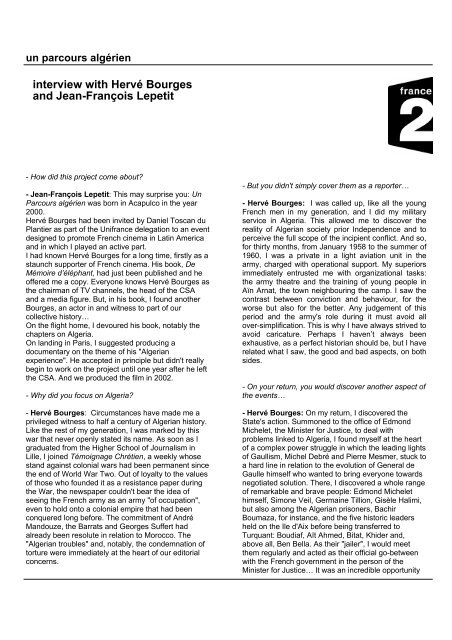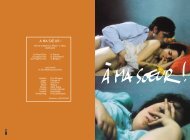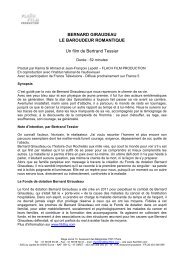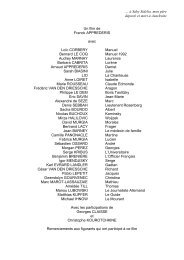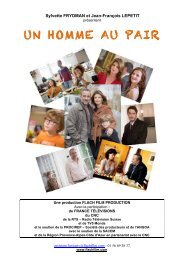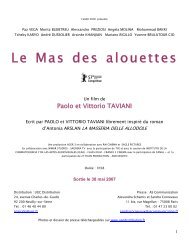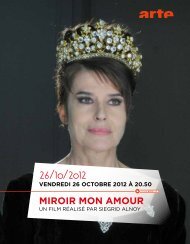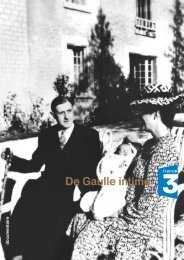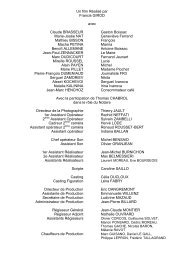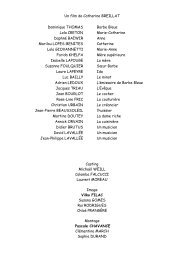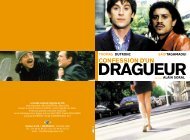Create successful ePaper yourself
Turn your PDF publications into a flip-book with our unique Google optimized e-Paper software.
un parcours algérien<br />
interview with Hervé Bourges<br />
and Jean-François Lepetit<br />
- How did this project come about?<br />
- Jean-François Lepetit: This may surprise you: Un<br />
Parcours algérien was born in Acapulco in the year<br />
2000.<br />
Hervé Bourges had been invited by Daniel Toscan du<br />
Plantier as part of the Unifrance delegation to an event<br />
designed to promote French cinema in Latin America<br />
and in which I played an active part.<br />
I had known Hervé Bourges for a long time, firstly as a<br />
staunch supporter of French cinema. His book, De<br />
Mémoire d’éléphant, had just been published and he<br />
offered me a copy. Everyone knows Hervé Bourges as<br />
the chairman of TV channels, the head of the CSA<br />
and a media figure. But, in his book, I found another<br />
Bourges, an actor in and witness to part of our<br />
collective history…<br />
On the flight home, I devoured his book, notably the<br />
chapters on Algeria.<br />
On landing in Paris, I suggested producing a<br />
documentary on the theme of his "Algerian<br />
experience". He accepted in principle but didn't really<br />
begin to work on the project until one year after he left<br />
the CSA. And we produced the film in 2002.<br />
- Why did you focus on Algeria?<br />
- Hervé Bourges: Circumstances have made me a<br />
privileged witness to half a century of Algerian history.<br />
Like the rest of my generation, I was marked by this<br />
war that never openly stated its name. As soon as I<br />
graduated from the Higher School of Journalism in<br />
Lille, I joined Témoignage Chrétien, a weekly whose<br />
stand against colonial wars had been permanent since<br />
the end of World War Two. Out of loyalty to the values<br />
of those who founded it as a resistance paper during<br />
the War, the newspaper couldn't bear the idea of<br />
seeing the French army as an army "of occupation",<br />
even to hold onto a colonial empire that had been<br />
conquered long before. The commitment of André<br />
Mandouze, the Barrats and Georges Suffert had<br />
already been resolute in relation to Morocco. The<br />
"Algerian troubles" and, notably, the condemnation of<br />
torture were immediately at the heart of our editorial<br />
concerns.<br />
- But you didn't simply cover them as a reporter…<br />
- Hervé Bourges: I was called up, like all the young<br />
French men in my generation, and I did my military<br />
service in Algeria. This allowed me to discover the<br />
reality of Algerian society prior Independence and to<br />
perceive the full scope of the incipient conflict. And so,<br />
for thirty months, from January 1958 to the summer of<br />
1960, I was a private in a light aviation unit in the<br />
army, charged with operational support. My superiors<br />
immediately entrusted me with organizational tasks:<br />
the army theatre and the training of young people in<br />
Aïn Arnat, the town neighbouring the camp. I saw the<br />
contrast between conviction and behaviour, for the<br />
worse but also for the better. Any judgement of this<br />
period and the army's role during it must avoid all<br />
over-simplification. This is why I have always strived to<br />
avoid caricature. Perhaps I haven’t always been<br />
exhaustive, as a perfect historian should be, but I have<br />
related what I saw, the good and bad aspects, on both<br />
sides.<br />
- On your return, you would discover another aspect of<br />
the events…<br />
- Hervé Bourges: On my return, I discovered the<br />
State's action. Summoned to the office of Edmond<br />
Michelet, the Minister for Justice, to deal with<br />
problems linked to Algeria, I found myself at the heart<br />
of a complex power struggle in which the leading lights<br />
of Gaullism, Michel Debré and Pierre Mesmer, stuck to<br />
a hard line in relation to the evolution of General de<br />
Gaulle himself who wanted to bring everyone towards<br />
negotiated solution. There, I discovered a whole range<br />
of remarkable and brave people: Edmond Michelet<br />
himself, Simone Veil, Germaine Tillion, Gisèle Halimi,<br />
but also among the Algerian prisoners, Bachir<br />
Boumaza, for instance, and the five historic leaders<br />
held on the Ile d'Aix before being transferred to<br />
Turquant: Boudiaf, Aït Ahmed, Bitat, Khider and,<br />
above all, Ben Bella. As their "jailer", I would meet<br />
them regularly and acted as their official go-between<br />
with the French government in the person of the<br />
Minister for Justice… It was an incredible opportunity


